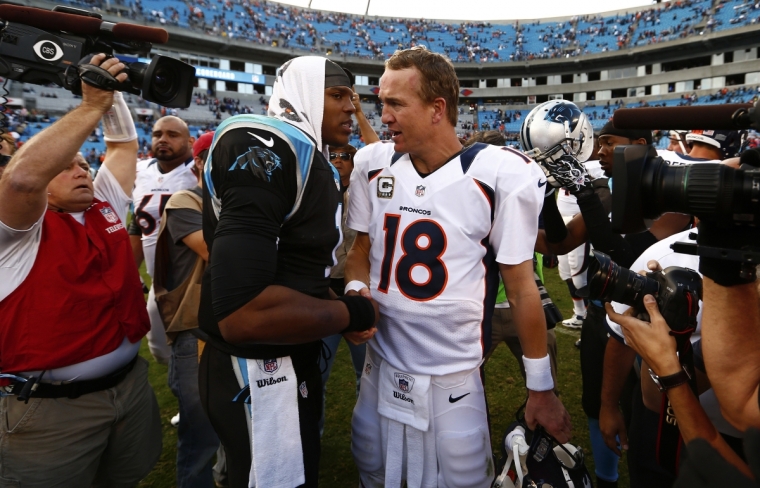Updated: From hip hop to squeaky clean, Super Bowl QBs Manning & Newton both evangelical Christians

SAN JOSE, Calif. (Christian Examiner)—The greatest storylines swirling around the Golden Super Bowl have to do with the highest profile position on the football field. Whether it's the possibility of it being the last NFL game for one of the game's greats of the past 20 years, Peyton Manning, or the potential coronation of this season's greatest star, Cam Newton, all eyes are on the quarterbacks this year.
I'm a living testimony that anything is possible. I'm an example of why people deserve second chances."
Manning and Newton are a study in contrasts. Manning is the son of an NFL quarterback who matched strong physical talent with one of the greatest minds the quarterback position has ever seen. Newton, the son of a pastor, is possibly the greatest athlete ever to sling a football in the NFL. Manning's squeaky-clean image and serious demeanor seem to hearken back to a previous era. Newton's flamboyance, as he ruffles feathers along the way, seems to be a perfect fit for today's hip-hop culture that understands that football is—above all else—entertainment. Manning is undoubtedly toward (or at) the end of his storied career. Newton is just entering his prime.
Yet despite their differences, the two grew up in evangelical Christian homes. Neither are as open about their faith as Tim Tebow and others. Both shy away from politics (though Manning has given more than $14,000 to federal-level Republican candidates since 2004). But both have also, at times, talked about their faith.
Newton's off-the-field problems dating back to his collegiate days are well-known, but the former Heisman Trophy winner grew as up as the son of a pastor.
"I'm a living testimony that anything is possible," Newton said, according to Charismamews.com. "I'm an example of why people deserve second chances."
When Newton rolled his truck in an ugly 2014 crash, many wondered how it would impact his health long-term, not to mention his football prospects. When he had a full recovery and ended up only missing one game, the Carolina Panthers star gave the glory to God.
"Somebody had His good hands on me," Newton told reporters. "One plus one always equals two. I'm looking at this truck. I'm looking at this accident, and I'm like dude, one plus one ain't equaling two, because I'm looking at this truck, and I'm like, somebody is supposed to be dead. Me being a religious person, God is good. I'm lucky to be standing in front of you today."
He has also been faithful to help others in the Charlotte community—and beyond. When a white supremacist shot at nine African-Americans in a Charleston church, Newton spent part of a day visiting the families of the victims. Newton has been incredibly active in community activities in Charlotte involving children. Those who have spent time around him through these events call his love for kids real—an attitude taught to him by his ministry-minded parents.
Just like Newton, Manning admits to past mistakes. Both quarterbacks express an understanding that they've been forgiven.
"Christians also make mistakes, just as non-Christians do," Manning wrote in his self-titled book, "My faith doesn't make me perfect, it just makes me forgiven ... ."
Despite Manning's clean image around the league, he had long been quiet about his Christian testimony. In his book , he wrote about how as a 13-year-old he committed his life to Christ in a Southern Baptist church in New Orleans. He says the pastor asked the congregation whether he knew where he'd go if he died tonight.
"The minister invited those who would like that assurance through Jesus Christ to raise their hands, and I did," he wrote. "Then he invited us to come forward, to take a stand, and my heart really started pounding. And from where we sat, it looked like a mile to the front.
"But I got up and did it. And I committed my life to Christ, and that faith has been most important to me ever since."
He admits that he has usually been less public about his faith than others—with many pointing to Heaven after scoring a touchdown. While he doesn't have any problem with others who do that, he wrote that he wanted his action to speak louder than his words. He also wrote about attending pregame chapel at the University of Tennessee and that he attended chapel each week with his team (then the Indianapolis Colts).
"For me generally it had always been the big four: faith, family, friends, and football," Manning wrote. "... As important as football is to me, it can never be higher than fourth. My faith has been number one since I was 13 years old."
And Manning's readiness to use his fame, influence and money to help others is nothing short of legendary. Last September, he treated an Indiana woman dying of cancer to a weekend to remember at Mile High Stadium in Denver where she experienced a behind-the-scenes look at the NFL and met Manning, whom she had enjoyed watching play for close to 20 years.
Yet according to longtime Indianapolis columnist Bob Kravitz, those experiences are just a drop in the bucket of Manning's off-the-field charitable activity.
"Whatever you read about, he does 10, 20, 30 times more things that you never read about," Kravitz wrote. "I can't tell you the number of e-mails I've gotten from people who said that Peyton did this, that or the other thing for a child or for a sick person that never made the newspaper, that wasn't part of the PeyBack Foundation, that was just a random act of kindness."